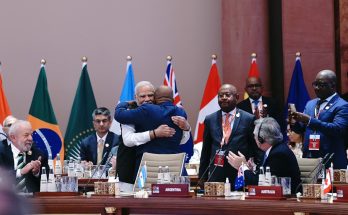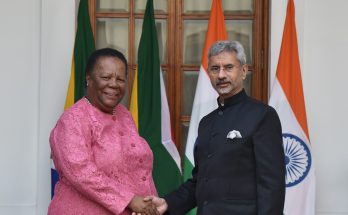 When was the last time an Indian prime minister travelled to four African countries in one stretch? This question has been asked with a tinge of anguish many a time in Africa circles, but with Prime Minister Narendra Modi heading to Mozambique, South Africa, Kenya and Tanzania early this week, it’s going to be replaced, mercifully, by what’s next. While there are many aspects to Prime Minister Modi’s trip to these African countries, the importance of his African odyssey lies in the fact that it’s actually happening, and on this scale. The importance of leaders’ visits to other countries can’t be overemphasised; in the 24/7 wired world, the semantics and showmanship of these trips provide the much-needed public resonance and a dash of glamour to these engagements.
When was the last time an Indian prime minister travelled to four African countries in one stretch? This question has been asked with a tinge of anguish many a time in Africa circles, but with Prime Minister Narendra Modi heading to Mozambique, South Africa, Kenya and Tanzania early this week, it’s going to be replaced, mercifully, by what’s next. While there are many aspects to Prime Minister Modi’s trip to these African countries, the importance of his African odyssey lies in the fact that it’s actually happening, and on this scale. The importance of leaders’ visits to other countries can’t be overemphasised; in the 24/7 wired world, the semantics and showmanship of these trips provide the much-needed public resonance and a dash of glamour to these engagements.
Ending diplomatic drought
PM Modi’s visits to the four African countries, barely nine months after hosting the largest gathering of African leaders on the Indian soil, therefore, is doubly welcome. Some sceptics may say that Modi has turned attention late towards a rising continent as he travels to the African mainland after visiting over 40 countries. But such quibbles miss the central point: in the last two decades, this is the first time a slew of high-profile visits are taking place from India to Africa, signalling sentiments of Afro-optimism in India’s diplomatic-strategic circles. Modi’s predecessor Manmohan Singh visited the US at least half a dozen times, but in his ten-year tenure he made standalone bilateral visits to only a handful of African countries, namely Nigeria in his first term, and Tanzania in second term. This had created summit-level diplomacy deficit between India and Africa, fuelling narratives of a neglect of Africa by India and India’s West fixation.
This lack of high-level visits stood out in stark contrast to top Chinese leaders, including President, Vice-President and Foreign Minister, visiting African countries frequently. Recent critiques of China’s engagement with Africa apart, if China has been more successful in the continent despite India’s much-vaunted anti-colonial solidarity and centuries-old cultural links with the continent, part of the answer lies in high-level diplomacy deficit.
Modi’s visit to Africa, preceded by President Pranab Mukherjee’s visits to Ghana, Cote D’Ivoire and Namibia and Vice-President Hamid Ansari’s trips to Morocco and Tunisia, end this prolonged period of diplomatic drought, and send a powerful message across to a resurgent continent that India is finally serious about pushing India-Africa relations onto a higher trajectory, not just in terms of rhetoric, but in reality. These trips signal Prime Minister Modi’s strategic design to engage all the regions of Africa through his triple S mantra of Skill, Scale and Speed, and position Africa as an important pole in his foreign policy calculus.
Leveraging Diaspora
 Apart from the potent symbolism of the first prime ministerial trip from India to the African mainland, Modi’s engagements with all these countries are expected to be substantive and showcase key facets of India-Africa strategic partnership, as enunciated in the 2015 Delhi Declaration. The choice of the four countries by PM Modi shows calibrated strategic thinking. The well-entrenched Indian diaspora in eastern and southern Africa is a powerful asset in India’s diplomatic toolkit, although it remains underleveraged and has not received the kind of attention its counterpart in the West has got. Some may think the comparison between India and China is gratuitous, but it can’t be wished away. In terms of diaspora and soft power, India has clear advantages compared to China: although the number of Chinese working in African countries is increasing, there is no long-standing Chinese diaspora, giving India a distinct advantage in this area. Besides, there is no Chinese equivalent of Bollywood, which is popular from Marrakesh to Maputo and Durban to Dakar. Not surprisingly, PM Modi has chosen Kenya, Tanzania, and South Africa as part of his first tour to the continent. Diaspora engagements will be high on the agenda, and Mr Modi is set to flaunt his Gujarat connection to create an emotive connect to predominantly Gujarati community in all these countries. The show in Durban, if frenzied preparations, are anything to go by, is going to compare favourably with his more spectacular shows in Western capitals.
Apart from the potent symbolism of the first prime ministerial trip from India to the African mainland, Modi’s engagements with all these countries are expected to be substantive and showcase key facets of India-Africa strategic partnership, as enunciated in the 2015 Delhi Declaration. The choice of the four countries by PM Modi shows calibrated strategic thinking. The well-entrenched Indian diaspora in eastern and southern Africa is a powerful asset in India’s diplomatic toolkit, although it remains underleveraged and has not received the kind of attention its counterpart in the West has got. Some may think the comparison between India and China is gratuitous, but it can’t be wished away. In terms of diaspora and soft power, India has clear advantages compared to China: although the number of Chinese working in African countries is increasing, there is no long-standing Chinese diaspora, giving India a distinct advantage in this area. Besides, there is no Chinese equivalent of Bollywood, which is popular from Marrakesh to Maputo and Durban to Dakar. Not surprisingly, PM Modi has chosen Kenya, Tanzania, and South Africa as part of his first tour to the continent. Diaspora engagements will be high on the agenda, and Mr Modi is set to flaunt his Gujarat connection to create an emotive connect to predominantly Gujarati community in all these countries. The show in Durban, if frenzied preparations, are anything to go by, is going to compare favourably with his more spectacular shows in Western capitals.
 While diaspora-centric engagements will be high on optics and steal the limelight, there will be quiet purposeful diplomacy focused on key areas of mutual concern and interest in all these capitals. Enhancing development cooperation, pivoted on India’s core strengths in capacity building training and knowledge industries, will be high on the agenda. In all these countries, Mr Modi is expected to present India as a prime partner in the continent’s resurgence by unveiling new Lines of Credit and assistance for infrastructure projects.
While diaspora-centric engagements will be high on optics and steal the limelight, there will be quiet purposeful diplomacy focused on key areas of mutual concern and interest in all these capitals. Enhancing development cooperation, pivoted on India’s core strengths in capacity building training and knowledge industries, will be high on the agenda. In all these countries, Mr Modi is expected to present India as a prime partner in the continent’s resurgence by unveiling new Lines of Credit and assistance for infrastructure projects.
Another top priority of PM Modi will be to dovetail the narratives of a rising India and African economic resurgence. Uncertain global economic situation and dramatic decline in commodity prices due to China’s economic slowdown may have adversely impacted Africa’s economic outlook, but despite these discouraging trends, Africa remains a zone of opportunity. Better infrastructure, improved governance, the growth of the service sector, combined with the expanding middle class consumer market, have enhanced the attractiveness quotient of Africa. The four countries chosen for PM Modi’s trip score high on all these indices, and therefore provide a base for India to upgrade and galvanise trade and investment across the spectrum.
Strategic Design
Providing more heft to the burgeoning strategic partnership will be an important priority. Against the backdrop of the rising tide of radicalism and terrorism in the large swathes of the continent, Modi’s talks with the top leadership in the four African capitals will focus on intensifying counter-terror cooperation. The Mumbai-like terror attack on the Westgate mall in Nairobi and the expanding footprints of terror syndicates like Al-Qaeda in Maghreb, Boko Haram and al-Shabaab underscore the imperative for India to firm up structured counter-terror cooperation through intelligence-sharing.
Enhancing maritime cooperation will be another priority as the blue economy dream, unveiled by Mr Modi at the IAFS-III, can’t be realised without proactive maritime cooperation with littoral African countries located on the Indian Ocean seaboard. Besides bilateral issues, PM Modi will, therefore, be looking to engage the leadership in Maputo, Pretoria, Nairobi and Dar es Salaam on a range of cross-cutting global issues, including the UN Security Council reform, climate change and sustainable development. The stasis in the African Union consensus on the UNSC reforms has impeded the momentum in the long-standing quest to create a more democratic UN Security Council, which is in tune with contemporary geo-economic realities. At the IAFS-III, the two sides supported each other’s UNSC aspirations, but it’s time to end prevarication and join hands resolutely to re-fashion global institutions of governance anew.
Chinese Checkers? The Way Ahead
 Modi’s visit to the four African countries will be closely watched in key capitals of the world and especially in Beijing, which has marched ahead in the race for Africa’s resources and markets. While it’s distorting to portray Africa as the hub of a new great game or neo-colonial scramble, it can’t be denied that the continent has emerged as a beacon of hope amid the prolonged global slowdown. The established as well as emerging partners of Africa are upping their game, and burnishing their strategy to score in this high-stakes safari. US President Barack Obama hosted a grand summit with African countries in 2014, and China has raised the bar by pledging $60 billion for Africa at FOCAC-II in Johannesburg in 2015. India has pushed the envelope by hosting its first-ever summit with the whole of Africa in October 2015 which was attended by more than 40 African leaders and representatives of the African continent. India, which itself is in need of foreign capital and technology, betted on the new African opportunity by pledging $10 billion LOC, which surpassed commitments made at the previous two summits. The two documents that emerged from IAFS-III have laid out an all-encompassing agenda for India and Africa to interlink their destinies closely in a rapidly mutating world, and aid each other’s resurgence. PM Modi’s trips to the four African countries are part of this mutually nourishing journey, and one can only hope that there are no full stops on the way, but only new frontiers and horizons.
Modi’s visit to the four African countries will be closely watched in key capitals of the world and especially in Beijing, which has marched ahead in the race for Africa’s resources and markets. While it’s distorting to portray Africa as the hub of a new great game or neo-colonial scramble, it can’t be denied that the continent has emerged as a beacon of hope amid the prolonged global slowdown. The established as well as emerging partners of Africa are upping their game, and burnishing their strategy to score in this high-stakes safari. US President Barack Obama hosted a grand summit with African countries in 2014, and China has raised the bar by pledging $60 billion for Africa at FOCAC-II in Johannesburg in 2015. India has pushed the envelope by hosting its first-ever summit with the whole of Africa in October 2015 which was attended by more than 40 African leaders and representatives of the African continent. India, which itself is in need of foreign capital and technology, betted on the new African opportunity by pledging $10 billion LOC, which surpassed commitments made at the previous two summits. The two documents that emerged from IAFS-III have laid out an all-encompassing agenda for India and Africa to interlink their destinies closely in a rapidly mutating world, and aid each other’s resurgence. PM Modi’s trips to the four African countries are part of this mutually nourishing journey, and one can only hope that there are no full stops on the way, but only new frontiers and horizons.
– This abridged version of this article has been published in the July 6 edition of The Asian Age.
(Manish Chand is currently CEO & Editor-in-Chief of India Writes Network, www.indiawrites.org, an e- magazine-journal focused on international affairs, emerging powers and Africa. He is Editor of “Two Billion Dreams: Celebrating India-Africa Friendship,” and has co-edited “Engaging with a Resurgent Africa (McMillan/ORF),” and “India-Africa Partnership: Towards Sustainable Development” (published by RIS and FIDC, 2015). He has served as Editor of Africa Quarterly, a journal focused on African issues and India-Africa relations).
Author Profile

- Manish Chand is Founder-CEO and Editor-in-Chief of India Writes Network (www.indiawrites.org) and India and World, a pioneering magazine focused on international affairs. He is CEO/Director of TGII Media Private Limited, an India-based media, publishing, research and consultancy company.
Latest entries
 India and the WorldMarch 3, 2024India-Denmark Connect: Red carpet for Indians to Red Sea cooperation
India and the WorldMarch 3, 2024India-Denmark Connect: Red carpet for Indians to Red Sea cooperation India and the WorldFebruary 17, 2024Munich Security Conference: Jaishankar, Blinken focus on Red Sea, Middle East
India and the WorldFebruary 17, 2024Munich Security Conference: Jaishankar, Blinken focus on Red Sea, Middle East India and the WorldFebruary 14, 2024Munich Security Conference report: Migration, war top security threats
India and the WorldFebruary 14, 2024Munich Security Conference report: Migration, war top security threats India and the WorldJanuary 23, 2024With “Ram to Rashtra” mantra, Modi consecrates Ram temple for national renewal
India and the WorldJanuary 23, 2024With “Ram to Rashtra” mantra, Modi consecrates Ram temple for national renewal







